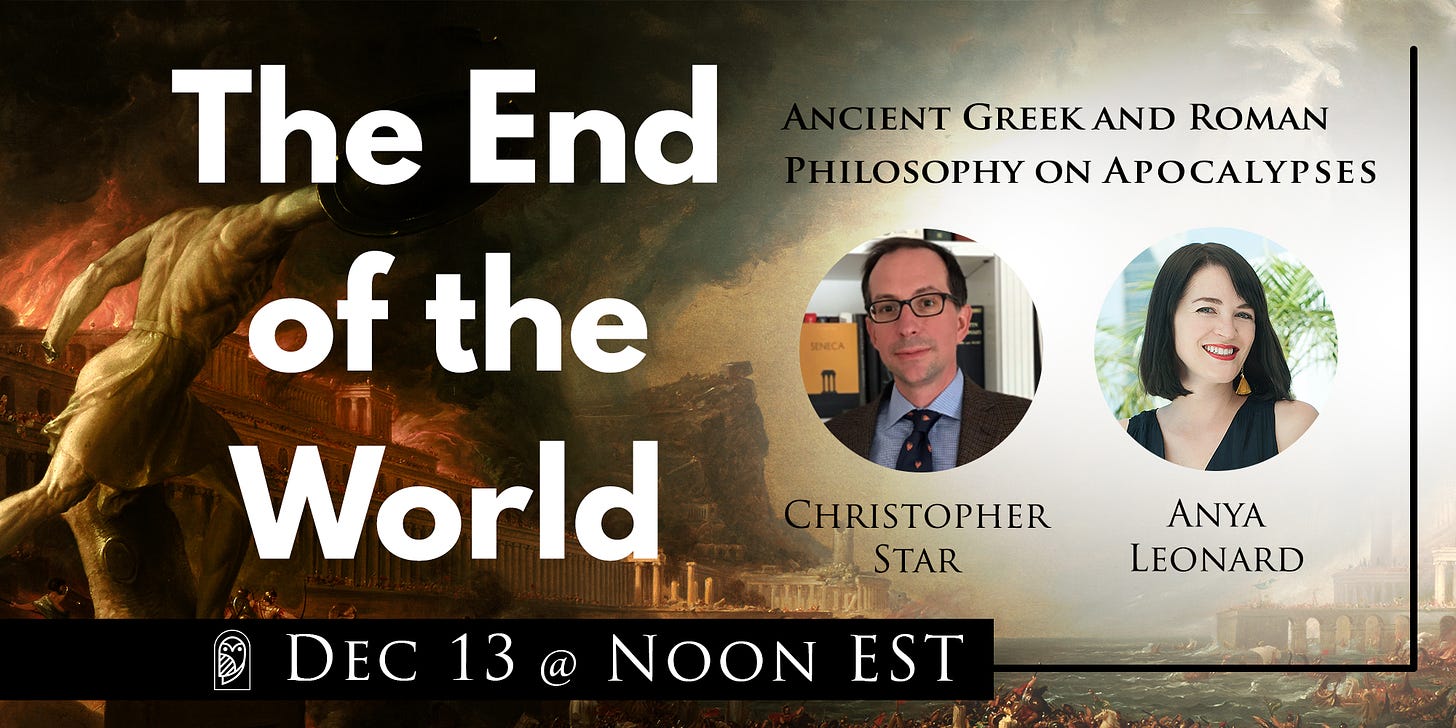There have been and there will be a great many destructions of humans, the greatest by fire and water, and the smaller ones by various other means. - Plato Timaeus 22c
Everything in existence will quickly be changed: either it will be turned into vapor, if the nature of the universe is one, or it will be scattered. - Marcus Aurelius Meditations 6.4
Dear Classical Wisdom Reader,
Turns out everyone has thought about the end of the world… it’s not just us.
Indeed it’s a topic that has been popular for time immemorial. What form it might take, what would be left, and how in the world we humans were going to handle it, was a central and much-debated topic in the ancient Greek and Roman eras.
It was discussed by Hesiod and Ovid and plenty of poets likewise… and the philosophers really got into it.
The Pre-socratic thinker Xenophanes argued that the world would be destroyed by water…while Plato posited that fires, disease and earthquakes had repeatedly decimated life on earth, and would continue to do so in the future.
The atomists Democritus and Epicurus argued that the earth, along with all the other worlds in the cosmos, would eventually be completely destroyed.
But it was the Stoics who offered the most paradoxical theory, that the cosmos is periodically destroyed by fire and then reborn.
Philosophers as diverse as Lucretius, Cicero, Seneca, and Marcus Aurelius offered various end of the world scenarios as a means to bring together physics, the understanding of the nature of the universe, with ethics, how to live the good life.
The goal was to contemplate, and possibly witness, the final event with understanding, acceptance, and resilience.
Was this considered morbid? A strange way to pass the time?
The exact opposite.
By thinking about the end of the world, the ancients felt, we gain the ultimate perspective of our place in the nature of the universe.
And so with that thought in mind, we invite you, dear reader to our special “End of the Year, End of the World” Webinar:
For many Greek and Roman philosophers, thinking about the end of the world was not only necessary but also good for you, especially from a psychological and ethical perspective…
So please join Christopher Star, Professor of Classics at Middlebury College, and author of “Apocalypse and Golden Age: The End of the World in Greek and Roman Thought” for this Apocalyptic talk:
This Discussion will take place on TUESDAY, December 13th, at Noon EST (NY time)
*Can't Make it Live? If you register in advance, we will send you the recording.*
I hope you can join us!
All the best,
Anya Leonard
Founder and Director
Classical Wisdom






.. and I feeeel fiiiiine.♪
"They are talking of the end of the world in human terms. Our world in galactic terms is insignificant. Even were we to be hit with a "world killer" asteroid (unlikely but possible- in fact, we are around ninety million years overdue for such an event), it could wipe out humanity but would do insignificant damage to the earth. Our planet would simply "lie Fallow" for a while and then resume its course without annoying humans buggering it up.
It is unlikely that the planet "Earth" itself will vanish in the next few billion years. But those living upon it will adapt and change or die out. That is certain.